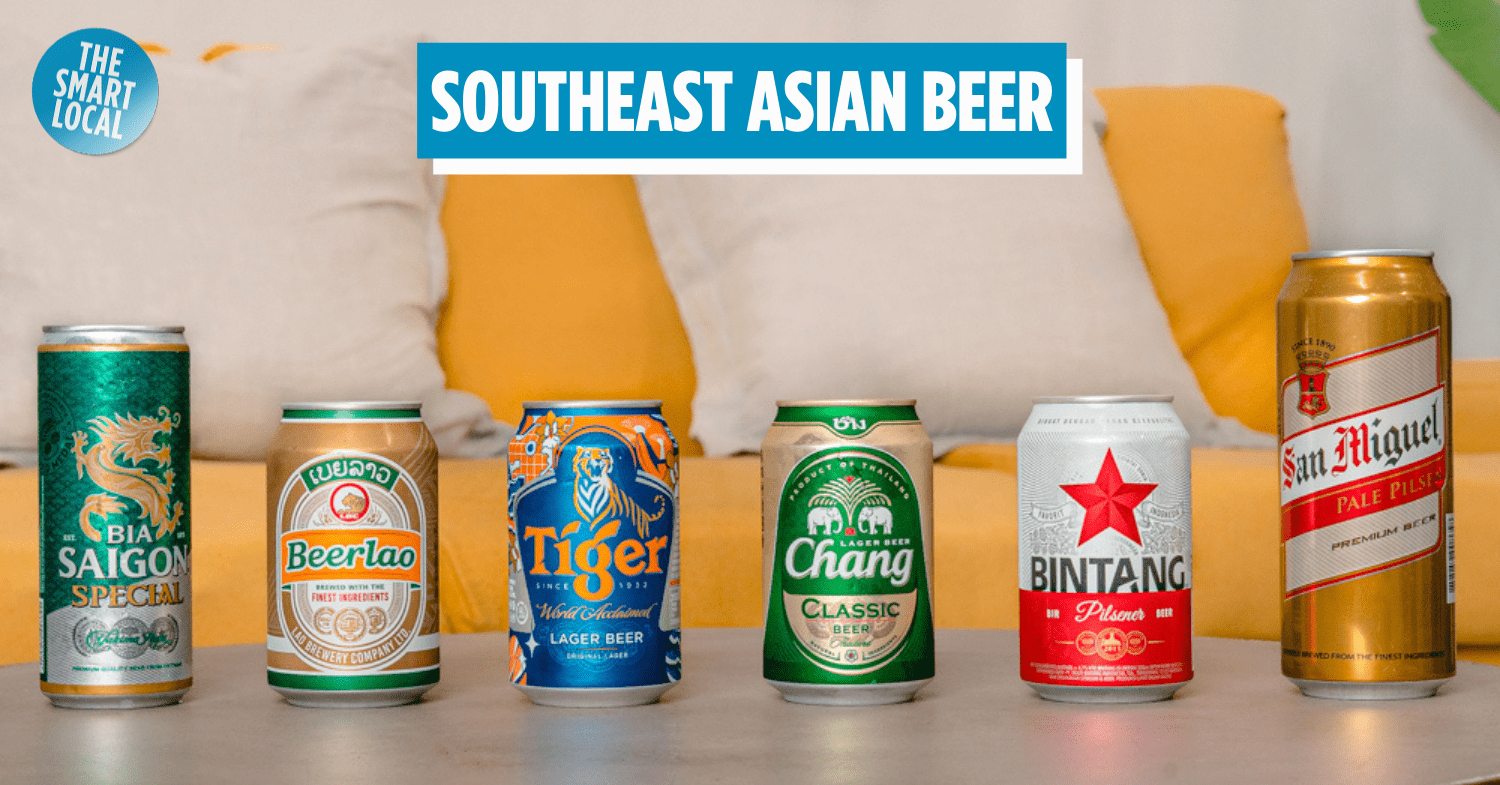Southeast Asian beer brands
There are so many ways to learn more about a country – whether through art, music, or talking to the locals. My favourite way is by tasting what they deem as their “national” drink, especially when it comes to Southeast Asian beers. Each country has a beer that’s distinct, either brewed with local ingredients or made to pair well with the cuisine.
For those who haven’t had the chance to travel to most of our neighbouring countries – same, neither have I. However, my colleague and I managed to source these beers in Singapore, and have taken it upon ourselves to do a taste test. Here’s what we have to say about these Southeast Asian beers.
How we reviewed the beers
Before we get into it, let’s break down exactly the factors we’ll be looking at that made these beers their national representatives. Taste is a no-brainer here – is it bitter, wheaty, smooth, or sweet? We’ll also be suggesting some snacks and food that go well with ‘em.
Next, you gotta consider the price if you don’t want your wallet to toh with you – we’ll be looking at the costs in their home countries. And of course, the alcohol percentage is one of the more important factors, ‘cause you don’t want something too light or too strong.
1. Singapore: Tiger Beer
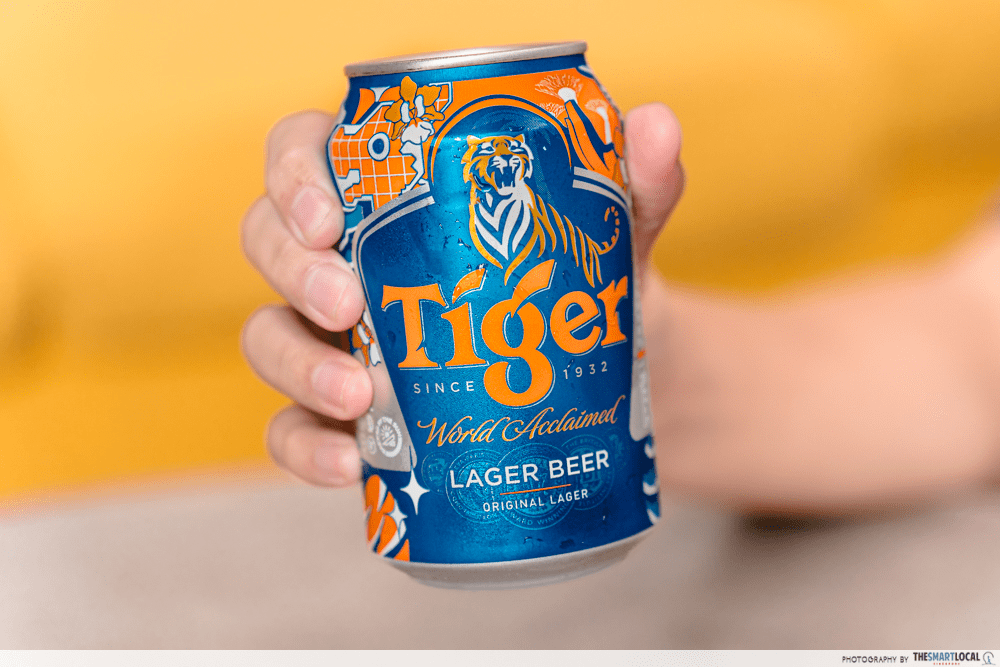
We have to start out with Tiger, our beloved locally-brewed concoction that you’ll find in just about any supermarket or mama shop.
Say what you want, but it’s the drink of choice across generations of Singaporeans. You’ll see them at millennial’s and Gen Z’s house parties, and on kopitiam tables where uncles are catching up with their buddies over a drink. Not to mention, the alcohol content is also decent at 5%.
There are different flavours and types of beers from Tiger with varying levels of alcohol by volume, or ABV, if you’re looking for something stronger or weaker. Tiger Crystal has 4.6% ABV, Tiger Radler has 2% ABV, and Tiger Soju Infused Larger has 5.5% ABV. But for this taste test we’re going with Tiger Original, the one most of us are familiar with.
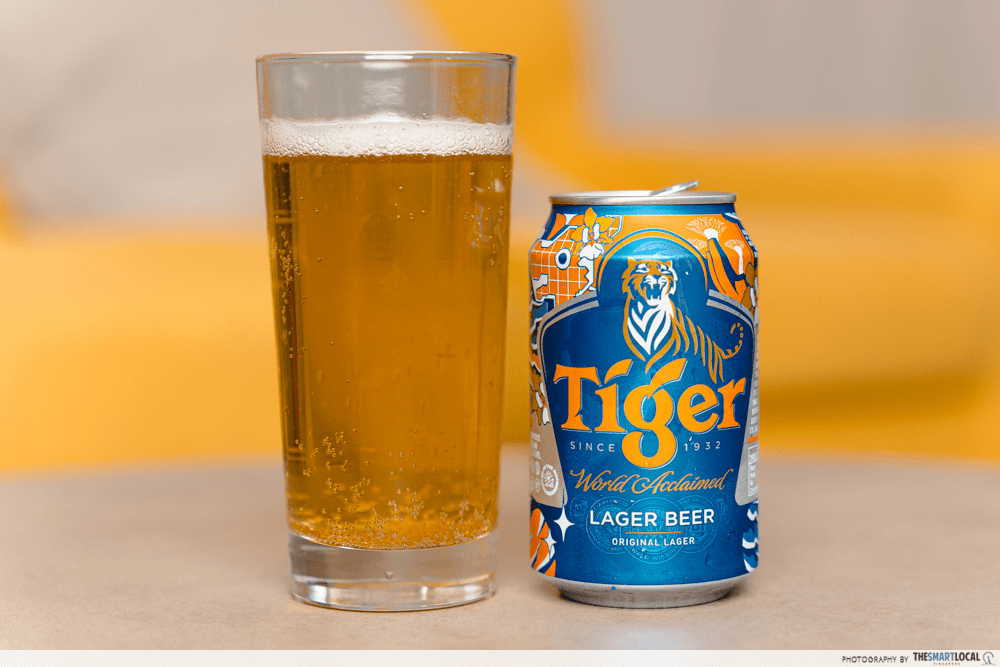
Price: ~$2.95
Alcohol content: 5%
Taste: It starts off with a hint of bitterness and a wheaty taste, which eventually mellows out, leaving a slightly sweet aftertaste. We think it’s decently smooth for beer. Its light flavour profile means it pairs well with fried or spicy food like wings, satay, or local favourite sambal stingray.
Although its alcohol content is quite standard, you can barely taste it. New drinkers might make the mistake of overdrinking if they think this has a lower alcohol content than other drinks. That said, remember to pace yourself.
Value for money: Buying in bulk makes it more worth it – at ~$2.60 a can. But it’s still affordable even at $2.95, especially when you’re enjoying greasy or spicy grub.
Where to buy: Available at most local supermarkets and minimarts
2. Thailand: Chang
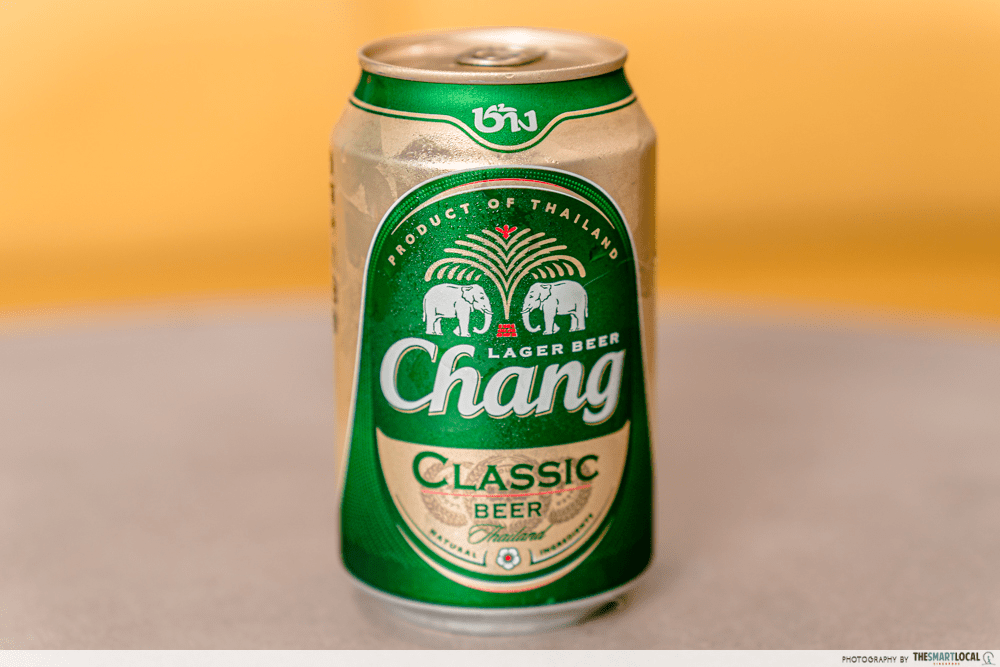
Frequent travellers to Thailand would have definitely come across a can of Chang beer when making a trip to the convenience store. It’s one of the 3 most common beers in Thailand – even the 2 elephants on the can make it obvious that it’s a Thai beer. While Singha and Leo are also popular choices for Thai locals, we decided to stick with Chang since it’s the easiest to find here.
Lucky for you, vacationers just back from the Land of Smiles can still savour this local drink of choice, as Chang is readily available at supermarkets here such as NTUC FairPrice.
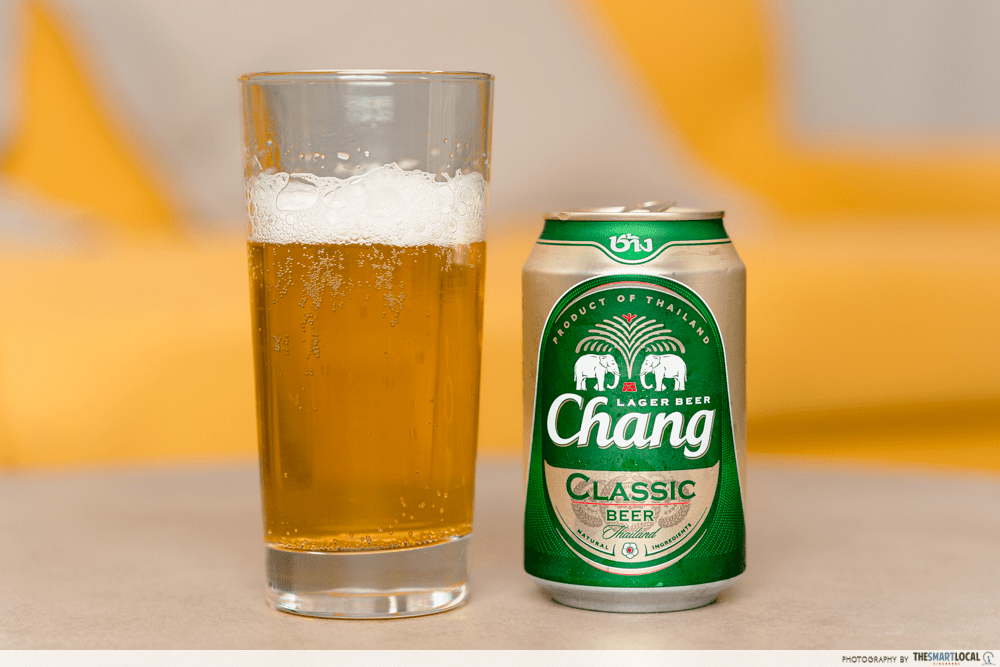
Price: ~S$2.60 in Singapore | ฿30-฿35 (~S$1.16-S$1.36) in Thailand
Alcohol content: 5%
Taste: Chang has a slight sweetness with hints of barley and malt. It’s light-bodied, making for an easy and smooth drink. We think this would pair well with fried and spicy food. No surprises then that it’ll go well with Thai favourites such as pad Thai, Thai green curry, or tom yum soup.
The beer also has good froth retention, which is quite refreshing. The sweetness is enhanced after you’ve had a bite of food, although I could only test this theory with a packet of fried peanuts. The alcohol taste is more prominent here, which some tend to favour as they enjoy the bitterness over the taste of barley and malt.
Value for money: Of course, you can’t beat the price in Thailand – and that’s probably why it’s so popular with the locals there. However, even for its price in Singapore, it’s still a very affordable beer.
Where to buy: NTUC FairPrice, Deliverylah, Shopee, Lazada
3. Laos: Beerlao White Lager
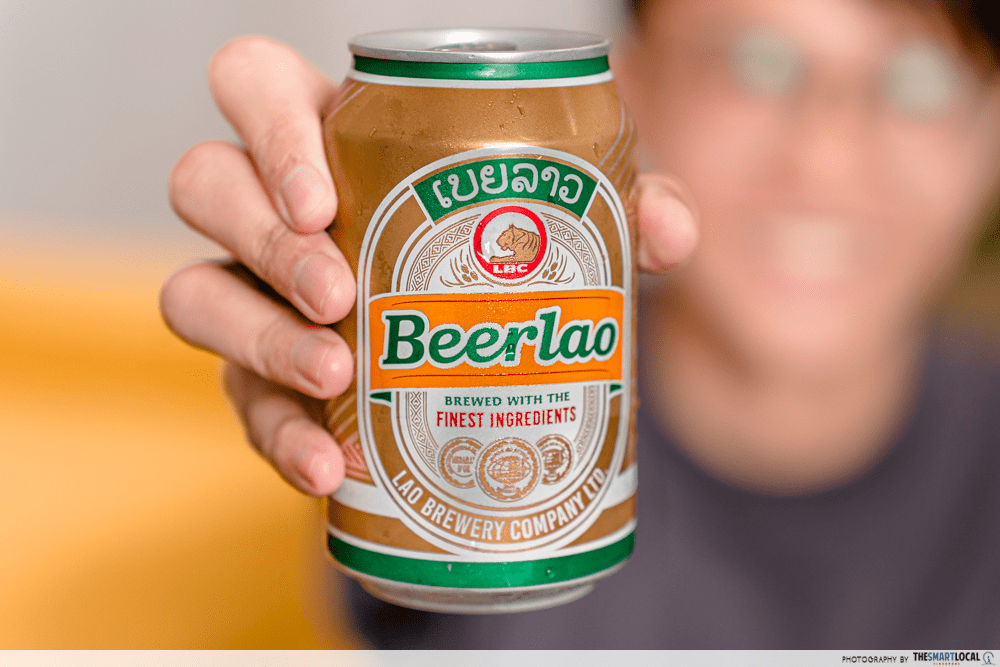
Now, we’re taking our beer adventure to Laos – with the popular Beerlao. They’ve really put the essence of Laos in the beer since it’s brewed from locally-grown rice.
Beerlao is a bit trickier to find in Singapore, although there are a number of bars that serve it for a higher price. You’ll still be able to find it at speciality beer importers such as Euro Link Wines & Spirits. But since it’s not a particularly popular brand, expect to pay a premium if you want to get your hands on one.
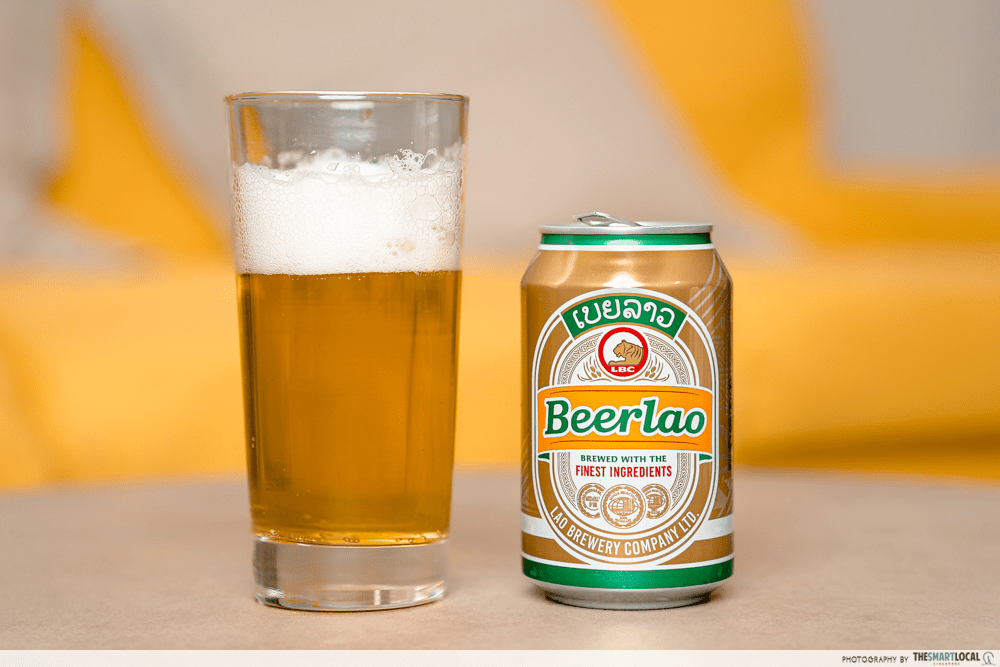
Price: ~S$4.60 in Singapore | ₭7,000 (~S$0.52) in Laos
Alcohol content: 5%
Taste: One of the closest in taste to European lagers, Beerlao has a decently strong body where the prominent flavours of rice can be picked up. We found it fairly sweet and very smooth, making it a refreshing drink to beat the heat. You can barely taste the alcohol, which can be dangerous as you might drink too fast.
Beerlao goes well with salty and spicy food but holds well on its own. Finding Lao cuisine may be tough in Singapore, but a spicy mango salad or a bahn mi would match the strong body and the sweetness of the beer well.
Value for money: It’s definitely quite costly if you’re planning on buying it in Singapore, considering it’s only ₭7000 (~S$0.52) in Vientiane, Laos. But, it has a distinct enough flavour that fans might consider buying it here after having it in Laos.
Where to buy: Euro Link Wines & Spirits
Euro Link Wines & Spirits
Address: 85 Lorong 4 Toa Payoh, Singapore 310085
Opening hours: Mon-Sat 2.30pm-6pm (Closed on Sundays)
Contact: 6255 7271
4. Vietnam: Saigon
Think of Vietnam and its variety of street food might come to mind. Banh mi, pho, ban xeo, and goi cuon (fresh spring rolls) are just the tip of the iceberg of what you can find. We can’t think of a better drink to pair street food with than with Saigon, the most popular beer in Vietnam.
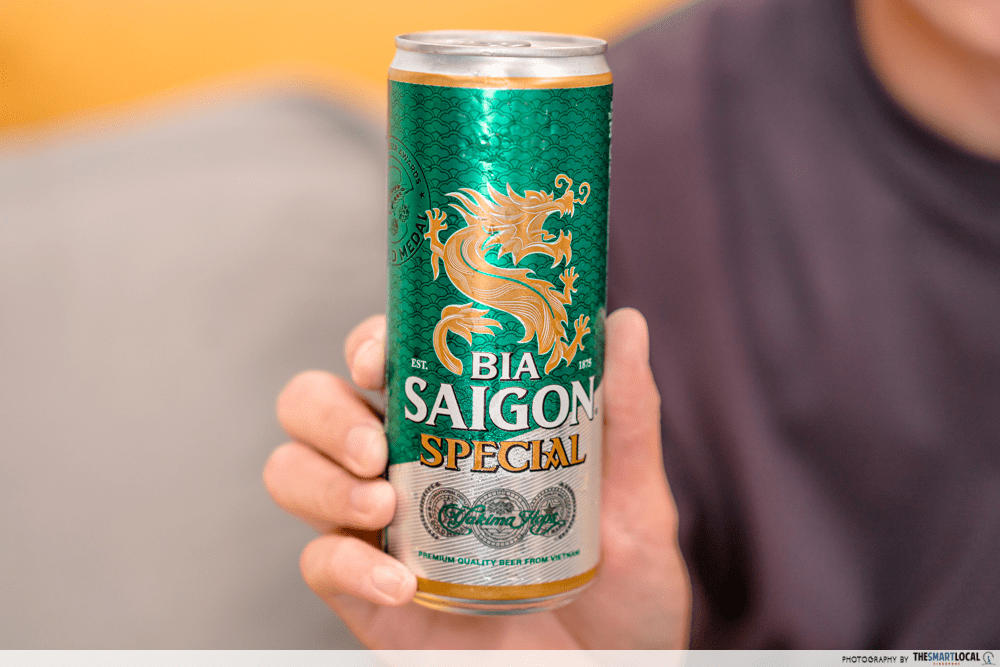
Saigon has other variations like the Bia Saigon Export, which has a 4.9% ABV, and Bia Saigon Gold, which has a 5% ABV, that are stronger. But for this experiment, we decided to go with the local’s choice of Bia Saigon Special, which has the lowest alcohol content on the list at 4.3%.
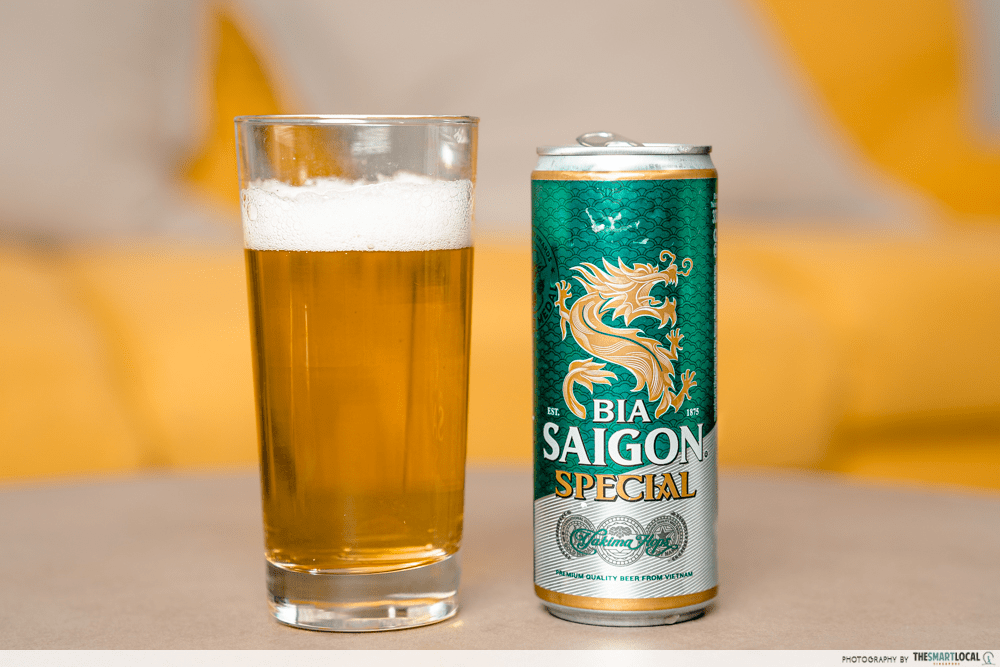
Price: ~S$4.50 in Singapore | 15000₫ (~S$0.86) in Vietnam
Alcohol content: 4.3%
Taste: This beer has a noticeable bitterness with a light body, and there are rather strong notes of wheat or barley. I wouldn’t consider it a smooth drink, but those who enjoy bitter beers like pale ales would probably enjoy Saigon more.
There’s a lingering bitter aftertaste due to its hoppiness, which was not enjoyable to me. It has good froth retention and didn’t fall flat, even after being left out for a good 10 minutes – making it a great choice for those who would rather nurse their beers than just chug them right away.
The bitter taste of Saigon would go well with common bar snacks like roasted peanuts that have a higher salt content. Those feeling more adventurous can pair it with grilled meat or seafood, which we think really cuts the bitterness down.
Value for money: At $4.50/can in Singapore, Saigon will not be my first choice of beer, when there are stronger ones at lower prices available. But if you find yourself in Vietnam on a hot day, it’s definitely the go-to choice – considering it costs ~S$0.86 there.
Where to buy: NTUC FairPrice (bottled), Alcohol Delivery, Lazada
5. Indonesia: Bintang
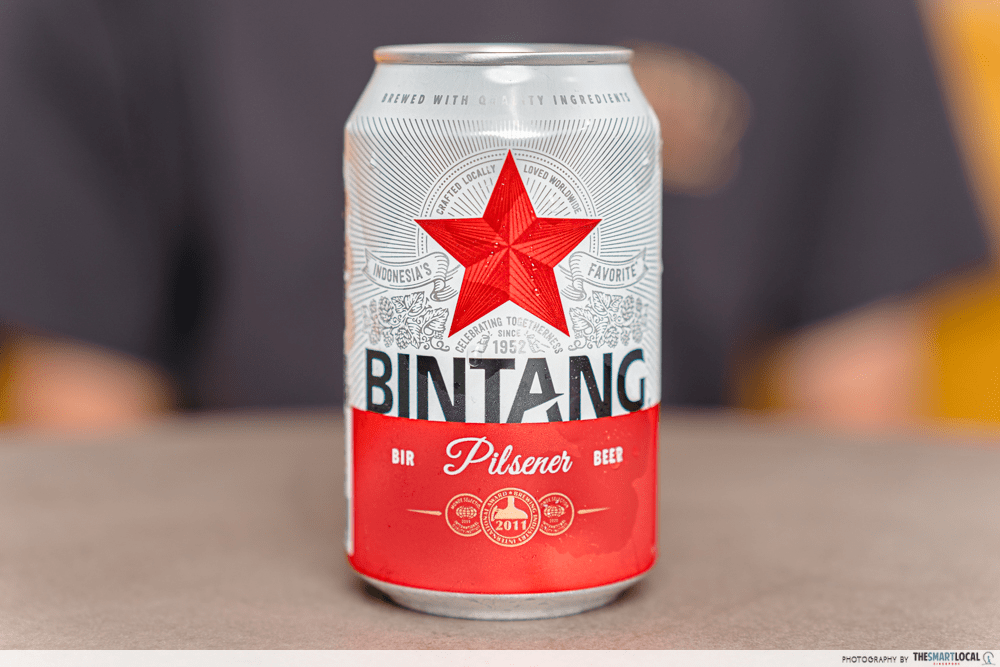
Bali, anyone? Bintang is another beer that you’ll definitely come across at restaurants, convenience stores and beach clubs all over Bali. Just like its name, which means “star” in Bahasa, the locals have deemed it the star of beers in Indonesia.
It does well in washing down spicy local Indonesian delights like an ayam penyet or a few sticks of sate padang, which is the Indonesian variant of Singapore’s satay – served with a spicy yellow sauce.
Bintang is not easily found here, save at some bars and restaurants. Alternatively, you can get them imported online from sites like Lazada.
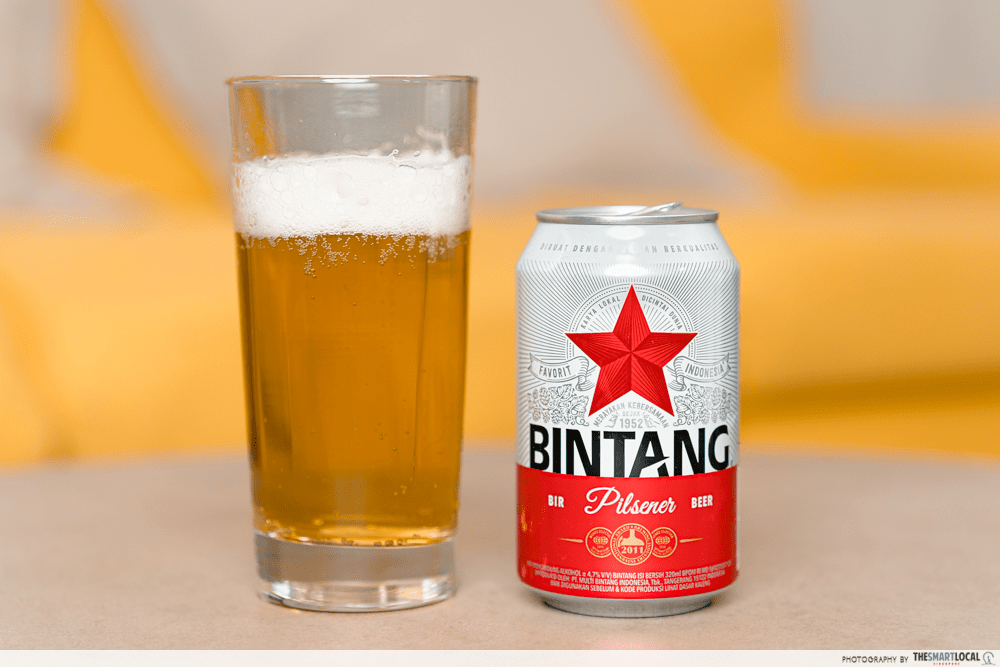
Price: ~S$3.80 in Singapore | 18,000 – 25,000 IDR (~S$1.62-$2.25) in Bali
Alcohol content: 4.7%
Taste: Bintang has fruity and sweet flavours come through after an initial bitter kick, which makes it a very smooth and refreshing drink. There is an overall lingering bitter aftertaste that does make it less enjoyable, but it’s easily masked if you’re drinking it with saltier foods such as chips and cured meats.
Value for money: Even at $3.80/can in Singapore, I think the price is reasonable for a refreshing drink on a hot day, especially if you’re a fan of its fruity taste.
Where to buy: Lazada (bottle), Ice-Cold Beer
Ice-Cold Beer
Address: 9 Emerald Hill Road, Singapore 229293
Opening hours: Mon-Thu 3pm-2am | Fri 3pm-3am | Sat 2pm-3am | Sun 2pm-2am
Contact: 6735 9929 | Ice-Cold Beer bar website
6. Philippines: San Miguel
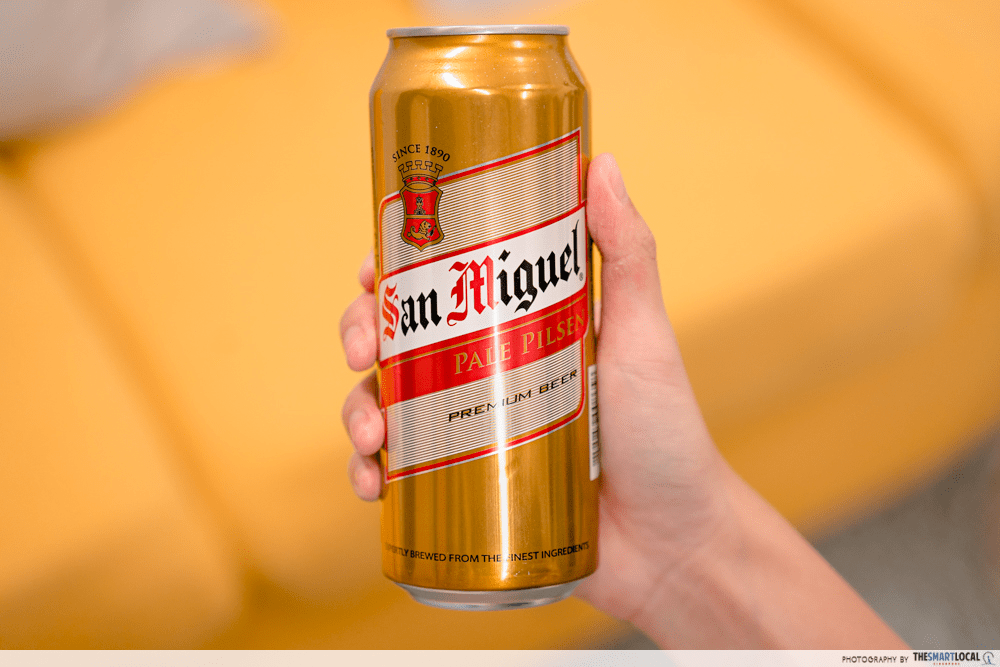
Ask any of the Kuyas (big brother) and Ate-Ate (big sister) in the Philippines what beer to drink and they’ll likely point you to San Miguel Pale Pilsen.
While the Redhorse counterpart is stronger, the Pilsen variation is cheaper. It’s also considered a “starter” beer for locals who just turned legal, since it’s not that strong for them and is readily available all over the Philippines. Since 4.7% isn’t that strong to them, starting off with the Pale Pilsen might be a good idea for an introduction to Filipino beer.
Thanks to the sizeable Filipino community in Singapore, San Miguel can be easily found at your local supermarket or the minimarts in Lucky Plaza.
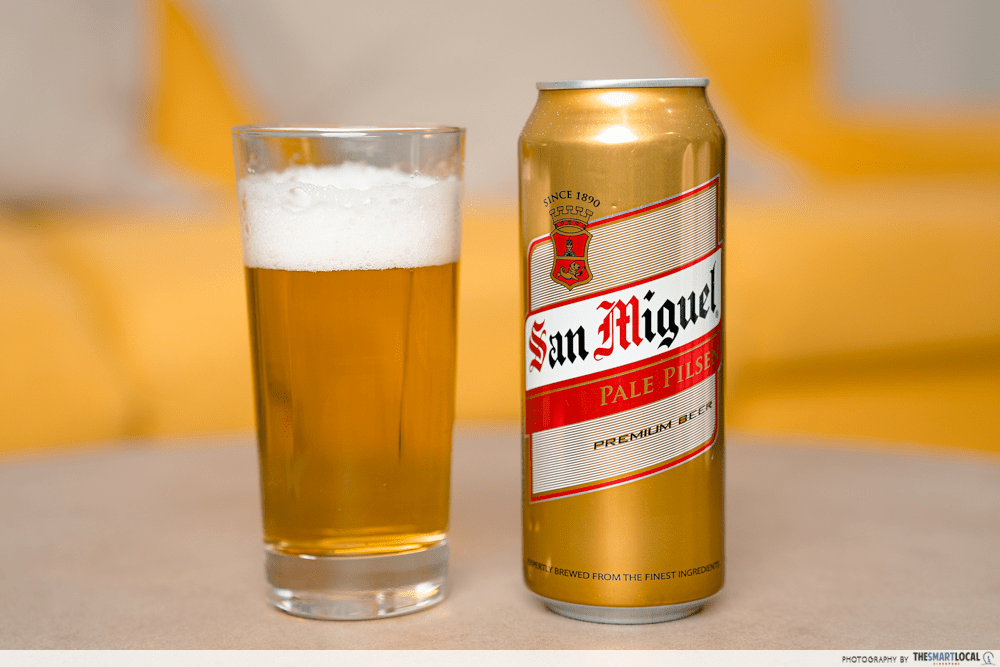
Price: ~S$4 in Singapore | ₱47-54 (~S$1.13-1.30) in the Philippines
Alcohol content: 5%
Taste: Take a whiff of the beer and you’ll get a strong, pleasant wheat smell that is reminiscent of bread. That being said, the beer is light and easy on the tongue, although it is slightly bitter. The malt and wheat notes come through after and linger quite a bit, which rounds out the taste of the beer nicely. This beer also has good froth retention and carbonation levels.
Locals would suggest pairing a cold pint of San Miguel with some crispy pork belly, fried spring rolls or sisig – a stewed, fried pig head and liver dish. If the local Filipino cuisine doesn’t sound like something you’d enjoy, any fried and spicy dishes would go well with the beer as well.
Value for money: $4/can is reasonable for an imported beer in Singapore and it is worth the splurge for a well-balanced beer, if you want to try something different from the regular ones you’ll find in supermarkets.
Where to buy: NTUC FairPrice, Lazada (bottle), Cold Storage (bottle), Cellarbration
Local pride for these Southeast Asian beer brands
It’s easy to see why these Southeast Asian beers are popular in their home countries. Just like Singapore, these SEA regions are just as hot and their respective local beers are exactly what’s needed to beat the heat. They also pair well with their local cuisine which is important for a beer to become a staple.
Once you’ve tried these beers, it might be time to schedule a trip to Thailand, Indonesia, Vietnam, Laos, or the Philippines soon to experience the beers like the locals in their homeland.
For more drinking-related content check out;
Photography by Liu Xing Ying.
